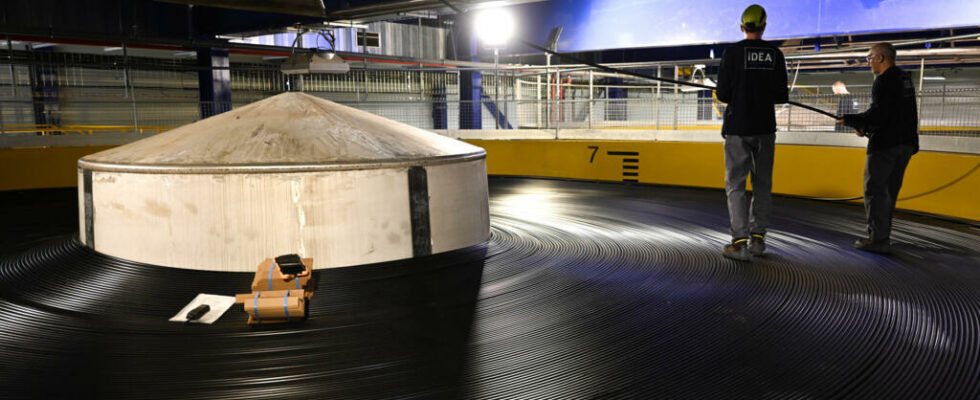Alcatel Submarine Networks is one of the few companies in the world manufacturing submarine telecommunications cables, vital infrastructure for global connectivity.
5 mins
This week, the French Minister of Economy and Finance announced the State’s purchase of 80% of Alcatel Submarine Networks (ASN). “ The acquisition of ASN is a strong signal which shows that we are able to identify and invest in strategic activities “, welcomed Minister Antoine Armand during his visit to the company’s site in Calais.
The firm produces and installs submarine cablesthese seabed routes essential for international communication. Today, in fact, and contrary to an often accepted idea, satellites only participate at the margins (conflict or isolated zones) in intercontinental communications. About 99% of Internet traffic passes through fiber optic lines laid on the ocean floor.
A network of almost 500 cableswithin which France, thanks to its position and its coasts, is a nerve center: four transatlantic cables land on its beaches, connecting Europe to the United States. And around fifteen arrive in Marseille, via the Mediterranean, connecting the continent to Africa, the Middle East and Asia. It is therefore not surprising that Bercy insists on the fact that “ mastering this technology and the infrastructures that depend on it is an issue of sovereignty and technological independence for France and its European partners. “.
However, in 2015, when the Finnish group Nokia bought Alcatel-Lucentthe State had let its Submarine Networks division leave in the package. Emmanuel Macron was then Minister of the Economy. “ They should have protected this strategic flagship », Estimates Ophélie Coelho, author of Digital geopolitics – Imperialism by leaps and boundslike other industry experts. “ We found it very strange that the State was not opposed to this sale », remembers Michael Delaunay, political science researcher, specialist in cables in the Arctic.
“ There is a lack of political sensitivity to digital issues »
ASN, which laid the first telegraph cable between Jersey and France in the 19th century, holds a third of the market share in the sector, alongside the American SubCom and the Japanese NEC. It is also one of the rare global companies to master the manufacturing of these precious fiber optic cables. She is also involved in the installation and maintenance of these infrastructures sometimes thousands of meters deep. “ Submarine cables are a complex and technical subject, which requires specific know-how and equipment. », insists Ophélie Coelho. “ There is a lack of sensitivity among politicians to these issues: we still tend to consider digital technology as a tool, not as a subject of geopolitical importance », Regrets the researcher in digital geopolitics.
However, the issues are very real. “ In digital infrastructures, there is a whole chain of dependencies. Cables, like data centers, are part of the strategic elements on which States depend for their life and digital survival. », Develops Ophélie Coelho. Although they were historically owned by consortiums of telecom operators who shared the cost and capacity of the cable, in recent years, the American digital giants, led by Google, have invested massively. “ The owners of these infrastructures have considerable influence over the entire chain, analyzes the researcher. Hence the importance of having control over one part of these strategic links, namely the production and laying of cables. Being a major player in dependency nodes allows us to have leverage to negotiate with powerful players. It’s a question of interdependence. »
This redemption is therefore a “ good news “, even if it only ultimately corrects a strategic error, believe the two experts. “ Not everyone was ingenuous », recalls Michael Delaunay. In 2013, Fleur Pellerin, then Minister of the Digital Economy, had already described “ strategic » the know-how of Alcatel Submarine Networks. “ Moreover, very quickly, certain State services said to themselves that perhaps we should secure this strategic asset. », underlines the researcher. The State has also increased its attempts to regain control of the company, notably through French firms such as Orange Marine.
The signed agreement ultimately provides for the possibility for the State to acquire 100% of ASN’s capital. Nokia retains a minority share of 20% of the capital for the moment but should be able to buy this share later.
An awareness fostered by the geopolitical context
The geopolitical context participated in “ wake up our political decision-makers », According to Michael Delaunay. He dates the beginning of awareness to 2015, with the affair of a Russian spy ship spotted near Western submarine cables. With Covid, we realized that the Internet was essential, he comments, then there was the outbreak of war in Ukraine by Russia and the sabotage of the Nord Stream gas pipeline in the Baltic. In recent months, Yemeni Houthi rebels have threatened to attack fibers deployed in the Red Sea, which is one of the crossroads of the global Internet. Events which drew attention to the fact that although the cables were strategic, they could represent a target or a risk.
Also readEurope monitors its sea cables: “The risk of sabotage exists”
As infrastructure “ reviews », since 2022, submarine cables are now part of a ministerial strategy for seabed control (MFM).
A sign of awareness at the European level, last February, Brussels recommended “ improve security and resilience » submarine cables. The digital component of the Connecting Europe Facility (CEF), set up to support the development of strategic infrastructure in the transport, energy and telecommunications sectors, has financed several submarine cables since 2021. to be less dependent on traditional routes by giving the network rerouting possibilities in case of outage », points out Michael Delaunay. Three projects are also planned in the Arctic. “ A revolution », according to the specialist, and another sign of the vitality of the sector.
